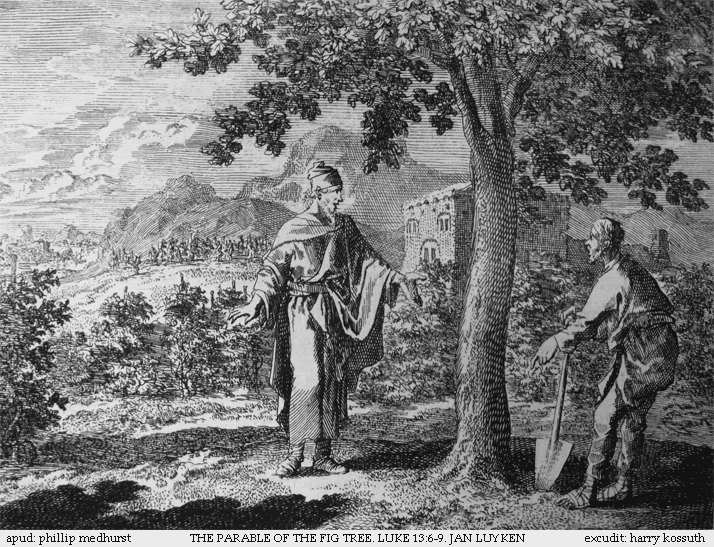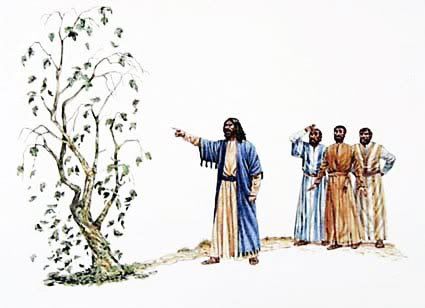6Then he told this parable: "A man had a fig tree, planted in his vineyard, and he went to look for fruit on it, but did not find any. 7So he said to the man who took care of the vineyard, 'For three years now I've been coming to look for fruit on this fig tree and haven't found any. Cut it down! Why should it use up the soil?'
8" 'Sir,' the man replied, 'leave it alone for one more year, and I'll dig around it and fertilize it. 9If it bears fruit next year, fine! If not, then cut it down.' " (Luke 13: 6-9)
 But what does the parable mean? Theologians and scholars tell us that the vineyard owner, who has run out of patience with his tree, represents God, Our Father—He who has created a people, rightly expects them to obey His laws and repent, and justly moves to destroy them when this is not the case. The man who took care of the vineyard—the gardener—is Jesus: the last opportunity to save Israel as a whole, and to save each of us as individuals. Because, we, of course, are the fig tree- seed scattered on the ground, miraculously grown, fed by the hand of Jesus. Because that is who cares for us, pruning our leaves, and shining upon us like the sun. Our loving Father has left us in the care of His Son, and only he can tend us, giving us the “water of life,” and nurturing our growth.
But what does the parable mean? Theologians and scholars tell us that the vineyard owner, who has run out of patience with his tree, represents God, Our Father—He who has created a people, rightly expects them to obey His laws and repent, and justly moves to destroy them when this is not the case. The man who took care of the vineyard—the gardener—is Jesus: the last opportunity to save Israel as a whole, and to save each of us as individuals. Because, we, of course, are the fig tree- seed scattered on the ground, miraculously grown, fed by the hand of Jesus. Because that is who cares for us, pruning our leaves, and shining upon us like the sun. Our loving Father has left us in the care of His Son, and only he can tend us, giving us the “water of life,” and nurturing our growth.Jesus, speaking more plainly, returns to the allusion of flowering plants and fruit, telling his disciples:
5"I am the vine; you are the branches. If a man remains in me and I in him, he will bear much fruit; apart from me you can do nothing. 6If anyone does not remain in me, he is like a branch that is thrown away and withers; such branches are picked up, thrown into the fire and burned. 7If you remain in me and my words remain in you, ask whatever you wish, and it will be given you. 8This is to my Father's glory, that you bear much fruit, showing yourselves to be my disciples. (John 15: 5-8)
We see through these words that Jesus is our salvation. Without Him, we are lost. With Him, we will bear much fruit-- fruit that endures. On this Sunday of Lent, we are called to look inward, conducting a thoughtful inventory of those things that prevent us from turning whole-heartedly to the Lord, those things that prevent our true repentance. Jesus has nourished us, watered us with His blood, nurtured us in the garden of His love. What have we done to prevent being chopped down?




No comments:
Post a Comment
Thanks for leaving a comment. If you wish to submit a prayer request, however, please do so above, using the "Contact" tab.